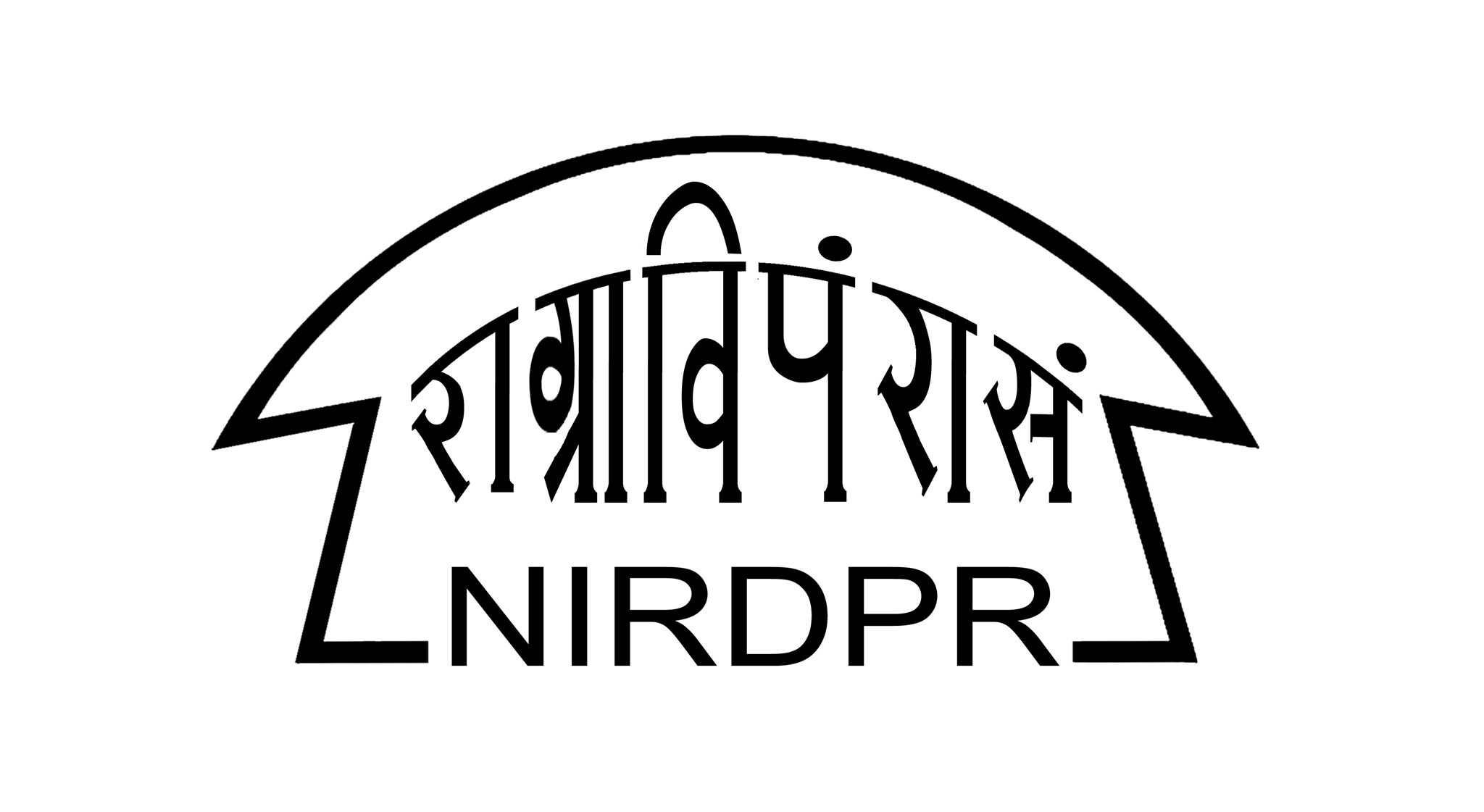
CONTENTS:
LEAD STORY: Committee System in Panchayats: Status, Issues and Relevance
NIRDPR Receives Development Leadership Award 2023
Training Programme on MGNREGS for Inclusive Development
NIRDPR Inks Pact with Population Council Institute
National Seminar on Good Governance Practices in MGNREGS
NIRDPR Organises Hindi Workshop for Reclassified Group ‘C’ Employees
International Training Programme on Leadership Development for ERs of Women Development Committee
UBA Cell, NIRDPR Conducts Two Mission LiFE Programmes
Training cum Exposure Visit to Best Practices of MGNREGS Works in Andhra Pradesh
Workshop on Technology Enabled Learning in the Context of Gram Rozgar Sevak (GRS) e-Prashikshan
MoRD, NIRDPR Organise SARAS Aajeevika Mela-2023 at 42nd IITF in New Delhi
LEAD STORY:
Committee System in Panchayats: Status, Issues and Relevance
Shri Ramit Maurya, Director, Ministry of Panchayati Raj, New Delhi
&
Dr P.P. Balan, Senior Consultant, Ministry of Panchayati Raj, New Delhi
pp.balan@gov.in
The committee system existing in the Panchayati Raj institutions can play a pivotal role in strengthening the decentralised governance system, and it is a fact that cannot be denied. It enables genuine participation of all elected members and officials of the Panchayat and line departments in local development. In certain cases, it has been observed that the elected members of the Panchayats have limited roles to play in the local governance as the activities are centred around the elected head. If the committee system is effectively put in place, it can bring more decentralisation in local governance where every elected member, functionary and civil society organisation can have a part. That is why the various State Acts give high prominence to the constitution of various committees.
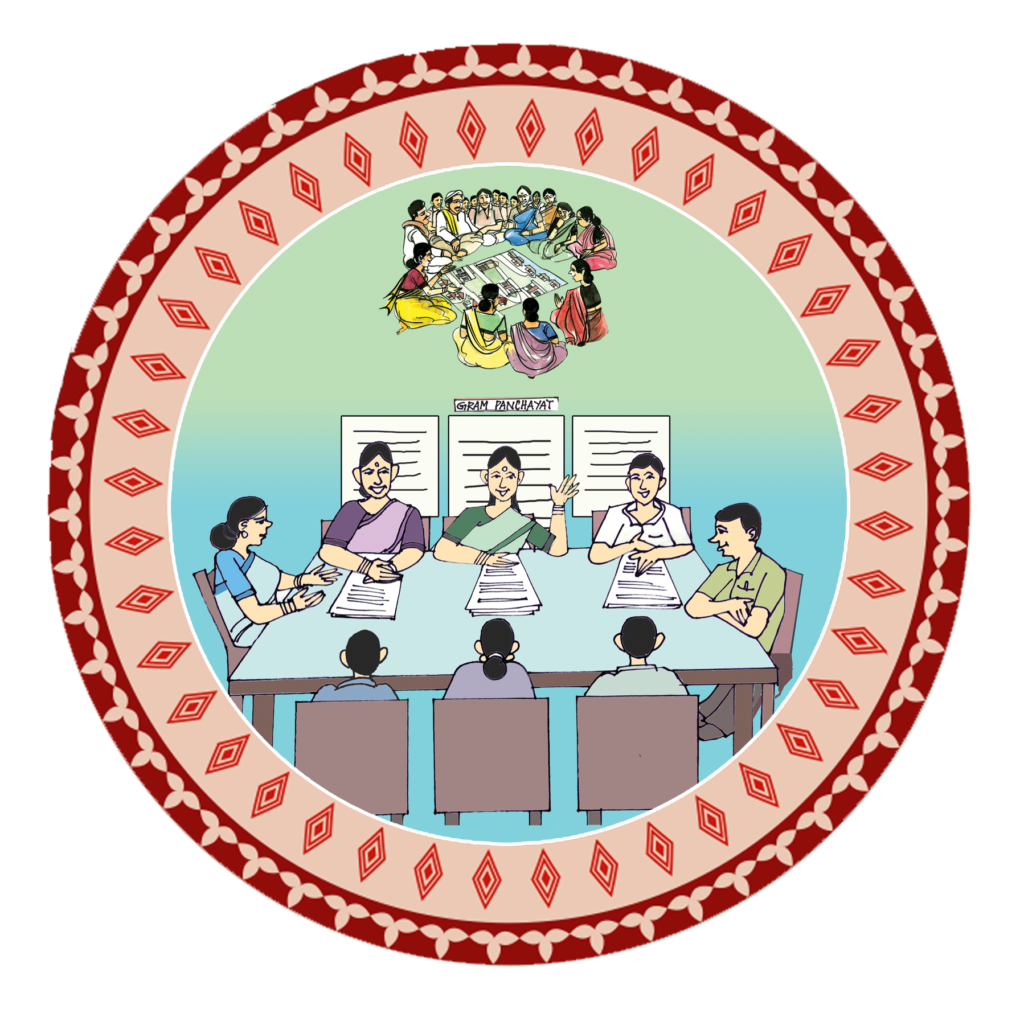
The State Acts mention the constitution of standing committees, functional committees, joint committees, steering committees, and sub-committees. Some States Acts stipulate the formulation of as many Committees as the Panchayats require. These committee’s structure and organisational setup vary from State to State. There is also a lack of uniformity and complementarity among its functioning – some committees are functional whereas many of them are in a dormant stage. There are cases of not constituting the committees at all even if the Act lays down specific provisions. It has become necessary to rejuvenate the committees existing as per the State Acts and make them functional. For this, foremost it is necessary to make the elected representatives aware of the importance of various committees to be constituted at different levels of Panchayati Raj Institutions (PRIs). There is also the need for separate training programmes on the operational part of the committees. It’s imperative that social mobilisation should be undertaken in a time-bound manner to mobilise people to make the committee system an effective instrument of local planning and development. In this way, the social capital should be built up at the local level, which in turn, can create an environment of cooperation and coordination among elected representatives, officials and members of the Gram Sabha.
Parallel bodies/institutions like the joint forest management committee, village education committee, village health committees, etc., should not be created at the local level without the involvement of the Panchayats. In most cases, what generally happens is that whenever flagship programmes or schemes of any department are implemented, instead of activating the corresponding Panchayat subject Committee, separate Committees are constituted at local levels disregarding the Panchayat committees. In such a situation, there would be a multiplicity of committees which could not serve the purpose. Further, in several instances, the representation of elected members is missing. There should also be instructions from the Line Departments of Central and State governments to utilise the service of standing committees of the Panchayati Raj Institutions and not to constitute separate committees outside the preview of the Panchayat. Without the involvement of all elected representatives, the formation of such committees is in contradiction to the 73rd Constitutional Amendment Act which was enacted for local development with inclusive participation.
Standing Committees:
Among all the committees to be constituted by the Panchayat, the role of standing committees stands distinct. As per the data available, most of the Panchayats have constituted standing committees such as Finance and Planning Standing Committee, Education and Public Health Standing Committee, Agriculture and Animal Resources Development Standing Committee, Industry and Infrastructure Standing Committee, and Women, Child Development and Social Welfare Standing Committee. These numbers vary from State to State as per their respective State Panchayati Raj Act. Some State Acts stipulate that Gram Panchayat can also constitute an additional committee on any of the subjects not specifically referred to in the Act.
Composition
The composition of the Standing Committees varies from State to State, For instance, in Kerala, only elected members are included in the Standing Committee whereas in West Bengal, ERs, officials and SHG members are part of the committee. Studies also show that the president of the Panchayat is heading the team, which is against the spirit of decentralisation. States like Chhattisgarh have set provisions for MLAs to be the ex-officio members of the Standing Committee in the Janpath Panchayat and MPs to be the ex-officio members of the Standing Committee in the District Panchayat. The Orissa Grama Panchayats (Constitution of Standing Committees) Rules, 2002 has the provision of seven Standing Committees having elected members and the Secretary of the Panchayat being the ex-officio Secretary of all Standing Committees. However, they may co-opt each of the Standing Committee not more than three persons, not being members of the Panchayat, having experience and knowledge of the subjects assigned to the respective Standing Committee. Andaman & Nicobar Island has a provision for a Standing Committee having five elected members. In MP, Sarpanch shall be the Chairperson and Up-Sarpanch shall be the Vice-Chairperson of the Standing Committee, respectively. However, nominations are invited for the vacant posts for filling the remaining posts from the eligible members of Gram Sabha.
Importance of Standing Committees
The prime factor is that the Standing Committees promote decentralization in the panchayat committee. In addition, elected representatives get more opportunities to function as sector enablers. Interaction with officials of the line department can lead to teamwork for convergence and innovation, Standing committees are supposed to function as a support system to the Gram Panchayat. The Standing Committee has a pivotal role in supervising the departments, schemes, programmes and other works within the jurisdictional areas and supporting the Gram Sabha.
Roles and Responsibilities of Standing Committees
The Standing Committee can identify the issues faced by the Gram Panchayat in the sectors concerned and recommend sector-wise developmental needs to the Panchayat Committee. It can coordinate with various line department officials and exhort them to attend the Standing Committee meetings. It can provide effective solutions for the issues faced and identify the appropriate scheme through convergence mode. The committee can come out with innovative ideas in the areas concerned for the development of Gram Panchayats. The Standing Committee can review the progress in the implementation of the decision taken and provide necessary support during the execution of works. Creation of public awareness on identified issues and mobilising people to solve problems can be another area of intervention. It can also perform its duties as monitoring and evaluation committee of a particular project.
Issues and Challenges
Although Standing Committees have been constituted at the Gram Panchayat level, it has been observed that most of them are dysfunctional. This is because of lack of proper understanding of the objective of Standing Committees. The committee’s linkage with other associations and public institutions such as health care, anganwadi, school education, etc., are also unconsidered. Lack of support from line departments is yet another factor. There is also the issue of proper awareness of the Central and State government schemes and fund availability to resolve the identified issues. The suggestions and recommendations of the Standing Committees are not considered in the Panchayat committee and they overrule its decisions. In many cases, it has been noted that the Panchayat Secretaries are not participating in Standing Committee meetings to give proper guidance. All the thematic areas covering under the 29 subjects are not covered in the functional areas of Standing Committees and many of the major themes are left out which is also a major concern.
There is high variation in the number of Standing Committees at the Gram Panchayat level from State to State. In Himachal Pradesh and Madhya Pradesh, there are only two Standing Committees, whereas, Jharkhand has seven Standing Committees. (See Table 1 below)
Table 1: Number of Standing Committees
| State/UT | Number of Committees |
| Andhra Pradesh | 5 |
| Bihar | 6 |
| Haryana | 3 |
| Himachal Pradesh | 2 |
| Jammu and Kashmir | 4 |
| Jharkhand | 7 |
| Karnataka | 3 |
| Kerala | 4 |
| Manipur | 3 |
| Rajasthan | 6 |
| Uttar Pradesh | 6 |
Source: Data collected from state departments of Panchayati Raj & Rural Development.
An analysis of the existing standing committees shows majority of States focus on the development of human resources and public works (Table 2). The role and responsibility of the committee are different as per the State Panchayati Raj Act. The Human Resource Committee has been constituted with the aim to focus on the generation of employment opportunities, education, health, women & child welfare system and rural sanitation at the Gram Panchayat level, while the Works Committee focus on the infrastructure development of Gram Panchayat. Only a few States have Committees such as amenities committees, production committees, etc.
Table 2: Standing Committees Constituted by the States
| Committees | Number Constituted |
| Human Resource Committee | 9 |
| Works Committee | 8 |
| Social Justice Committee | 7 |
| Finance Committee | 6 |
| Education Committee | 3 |
| Planning Committee | 3 |
| Agriculture Committee | 3 |
| Production Committee | 2 |
| Administration Committee | 2 |
| Amenities Committee | 2 |
| General Committee | 2 |
Source: Data collected from state departments of Panchayati Raj & Rural Development.
Suggestions for the Effective Functioning of Standing Committees
- As Standing committees are strengthening decentralisation within the Panchayat, it needs a more focussed approach Sarpanch need not be made chairperson of the standing committee. She/he can be the ex-officio member of various standing committees and participate in the meeting.
- Every elected member should be a member of at least one of the Standing Committees. Women and SC representatives must also be included.
- The number of Standing Committees has to be increased considering the devolution of power at the Gram Panchayat level covering 29 subjects under the Eleventh Schedule.
- A steering committee consisting of the Chairperson of various Standing Committees must be constituted in every Panchayat to have an overall understanding of the recommendations made by the various Standing Committees.
- The meeting of the Standing Committees must be held prior to the Panchayat Committee meeting and its recommendations are to be discussed in the Panchayat Committee. The final decision on the recommendations made by the Standing Committee shall be taken by the Panchayat Committee.
- The Standing Committee must be given a central role in the planning, implementation, and monitoring of the project under its subject matter.
- The related Standing Committee shall oversee all the activities (planning and implementation) undertaken by the Panchayat.
- Capacity building of the Standing Committee members is very much essential as envisaged in the National Capacity Building Framework (NCBF) 2022. Joint training programmes of ERs and functionaries are required for team building and coordination.
- There must be uniform provision for remuneration and sitting fees for the Standing Committee members which may act as a motivation factor for the timely conduct of meetings and active participation of the members.
- Participation of line department officials concerned must be made mandatory in the Standing Committee meetings.
- Non-officials (subject matter experts) may also be included in the Standing Committees for detailed discussion on the identified issues in Gram Panchayats.
- In the present context of localising SDGs, Standing Committees have to focus on the nine identified themes. The activities may be mapped accordingly.
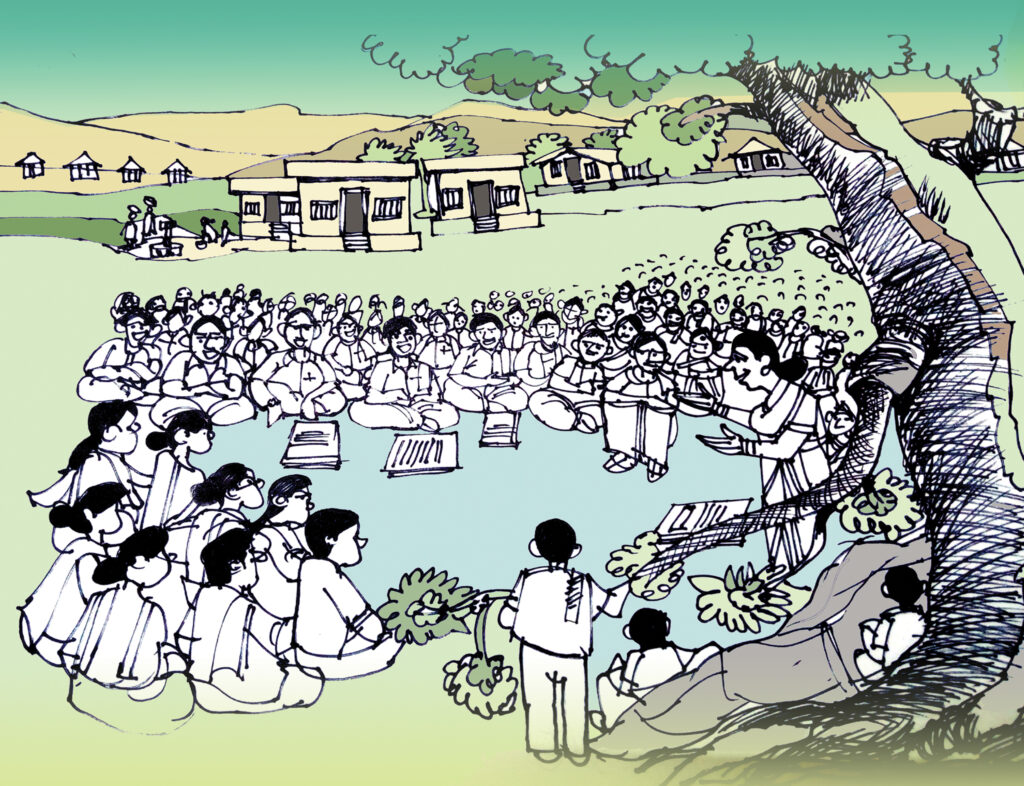
Functional Committees
In addition to the constitution of Standing Committees, some of the State Acts have provisions for the constitution of functional committees. These functional committees serve as supportive systems to the standing committees. For example, in Telangana, seven Functional Committees such as Sanitation and Drinking Water, Health and Nutrition, Education, Social Security and Poverty Reduction, Natural Resource Management, Agriculture, and Infrastructure are in existence.
The Functional Committees need to take a lead role in the preparation of the Village Development Plan. Collection of related data from different sources, including the line departments’ review of the present status of the service, inspection of the village through a transect walk, conducting situational analysis, use of participatory methods in decision-making, assessment of the requirements of the community, taking stock of availability of resources, preparing the plan for the sector and allocating the resources and deliverable outcomes to be approved in the Gram Sabha are the importance activities. The Functional Committees in Telangana technically support the Panchayats in the preparation of the Gram Panchayat Development Plan.
In Madhya Pradesh, Gram Sabha can constitute ad-hoc committees for the implementation of any time-bound work. The committee shall comprise various stakeholders and it ceases to exist after submitting the completion report and evaluation of the work by the Gram Sabha. Every committee shall be responsible and accountable to the Gram Sabha and shall work under its control and supervision. The Gram Sabha has the power to remove any member of the Standing Committee or other committees at any time for reasons which have to be recorded in writing. In Kerala, beneficiary committees are constituted by the Gram Sabha for the implementation of various projects.
According to the PR Act, in Tamil Nadu, every Gram Panchayat has to constitute Appointments Committee, Welfare Committee, Health, Water and Sanitation Committee, Public Distribution System Committee, Agricultural Production Committee, Works Committee and Education Committee. Every committee shall prepare respective sectoral annual and perspective development plans for the Panchayat. The chairman of each committee shall submit a separate plan to the Gram Panchayat. The Appointments Committee shall meet whenever selection for any post in the Gram Panchayat has to be made. The Standing Committees function at the District Panchayat level such as Food and Agriculture, Industries and Labour, Public Works, Education, Health and Welfare including prohibition. The District Panchayat can constitute additional standing committees for such purposes as they are necessary.
Joint Committees
A Panchayat, by joining hands with other Panchayats, can constitute joint committees for carrying out jointly responsible work of the two Panchayats. This practice exists in many of the Panchayats. The committee will solve any differences of opinion that arise between the Panchayats amicably.
Working Groups
States like Kerala constitute working groups on thematic areas for preparing draft development plans to be discussed in the Gram Sabha meetings. The working group is constituted in a general body convened at the Panchayat level. The chairman of the working group will be an elected representative and the convenor will be an official. For example, the convenor of the working group on agriculture would be the agricultural officer. The vice chairman of the working group is an expert in the thematic area. There is proper representation for women and SC/ST in the working groups.
Steering Committee
At the Panchayat level, Steering Committees are constituted to consolidate the decisions taken by various Standing Committees. The report would be then submitted to the Panchayat committee for approval and perusal of action.
Conclusion
The committee system existing as per the Acts of various states is intended for good governance. It gives abundant scope for elected members, officials, and members of civil society originations to take part in the planning process and implementation. Teamwork can enhance transparency and accountability systems in PRIs. People’s participation can also be ensured in the implementation of various schemes. Convergence of schemes is another objective which can help to prevent wastage and extravagance. Different sub-committees constituted by the standing committees also serve as monitoring committees which can ensure quality and perfection. To conclude, there is a felt need to strengthen the committee system mentioned in the Panchayati Raj Acts of various States through its proper constitution and by ensuring its effective functioning.
NIRDPR Receives Development Leadership Award 2023
The National Institute of Rural Development and Panchayati Raj (NIRDPR) is a premier institution in rural development and Panchayati Raj under the Union Ministry of Rural Development. Established in 1958, the institution has made remarkable contributions to the social and economic development of rural India for more than six decades.
The National Institute for Rural Development and Panchayati Raj was awarded the Development Leadership Award 2023 by the Agriculture Today Group on 21st December 2023. The award was given for its outstanding work, which has positively touched the lives of millions of rural people. NIRDPR was selected for the award by the National Awards Committee, under the Chairmanship of Honourable Former Chief Justice of India, Justice P. Sathasivam.
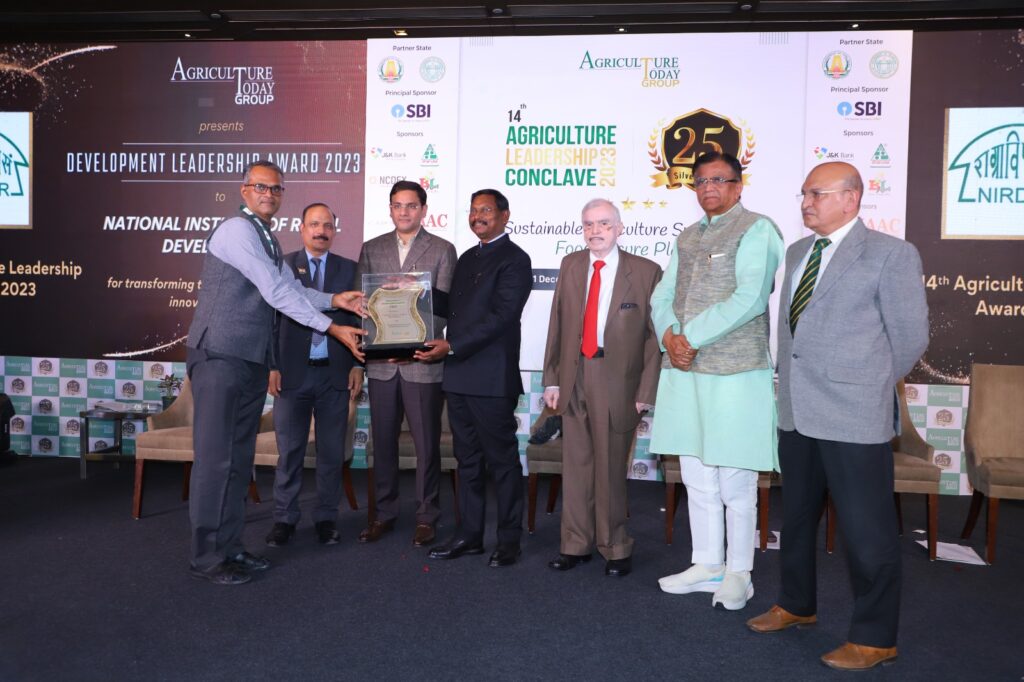
In its citation of the award, the committee observed that “As a ‘think-tank’ for the Ministry of Rural Development and the Ministry of Panchayati Raj, NIRDPR’s work focuses on achieving inclusive and sustainable improvement in the quality of life of rural India through research, creation of knowledge base, capacity building of stakeholders and development interventions. The institution has operationalised the core value of sustainability through its capacity building programmes in the spheres of conserving resources, improving the resource use efficiency of scarce resources, building resilience among rural communities, providing responsible and decentralised governance mechanisms and supporting and improving rural livelihoods. It has also made significant contributions to the designing, implementation and monitoring of flagship development programmes of the Government of India.”
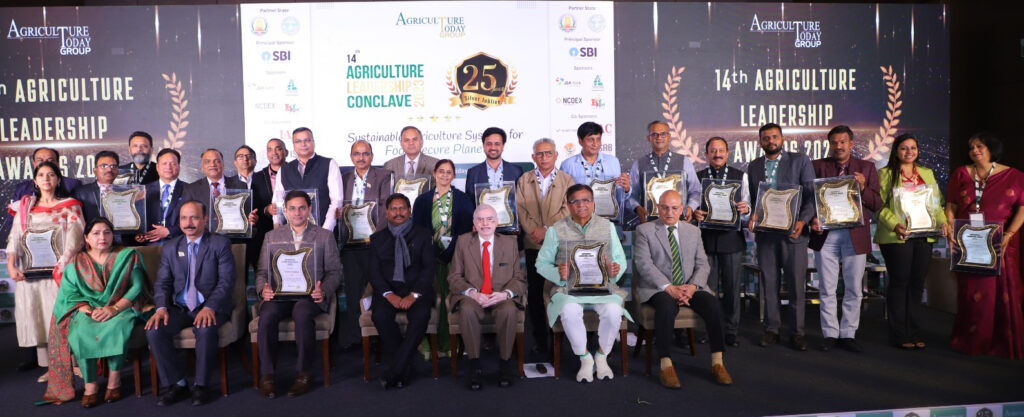
The award was given by Shri Arjun Munda, Honourable Minister of Tribal Affairs and Minister of Agriculture and Farmers’ Welfare, at a function held as part of the 14th Agriculture Leadership Conclave, in New Delhi on 21st December 2023. Dr Surjit Viraman, Associate Professor, NIRDPR received the award on behalf of the Institute. The function was presided over by Honourable Former Chief Justice of India, Justice P. Sathasivam.
Training Programme on MGNREGS for Inclusive Development
The Centre for Wage Employment & Livelihoods of the National Institute of Rural Development and Panchayati Raj organised a three-day training programme on Mahatma Gandhi National Rural Employment Guarantee Scheme for Inclusive Development, on its Hyderabad campus, from 18th -20th December, 2023. A total of twenty-four participants from ten states engaged in a three-day deliberation on how inclusive development can be ensured under the scheme.
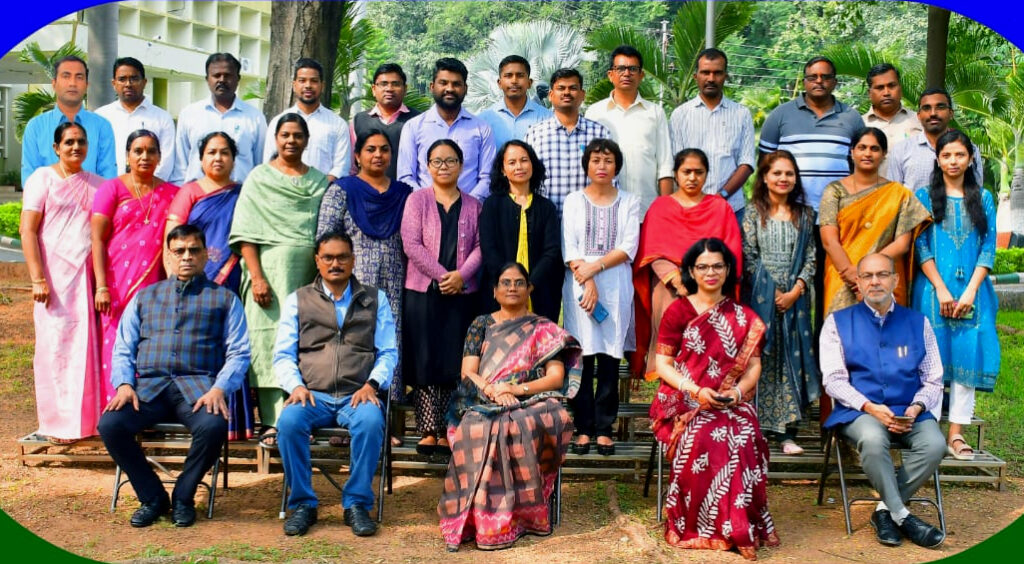
A truly inclusive society must prioritise respect for all human rights and fundamental freedoms, embrace cultural and religious diversity, champion social justice, and cater to the unique needs of vulnerable and disadvantaged groups. Democratic participation and adherence to the rule of law are essential pillars in fostering inclusivity. The concept of social inclusion is grounded in a subjective comprehension of what is deemed ‘right’ or ‘fair’. In pursuit of this goal, the government has implemented interventions designed to enhance inclusiveness. These strategies aim to render the country’s planning and government budgeting more responsive to the requirements of vulnerable sections, effectively addressing the challenges they encounter.
The inclusivity of the Mahatma Gandhi National Rural Employment Guarantee Scheme (NREGS) is evident when examining the active involvement and employment opportunities it provides for various social groups. A supplementary goal of the Mahatma Gandhi NREGA is to empower socially disadvantaged groups, including Scheduled Castes (SCs), Scheduled Tribes (STs), and women, through legislation grounded in rights. The Act specifies that projects creating individual assets should prioritise lands or homesteads owned by households from socially marginalised communities such as SCs, STs, nomadic tribes, de-notified tribes, families below the poverty line, women-headed households, physically handicapped-headed households, beneficiaries of land reforms, beneficiaries under the Indira Awaas Yojana, and beneficiaries under the Scheduled Tribes and Other Traditional Forest Dwellers (Recognition of Forest Rights) Act 2006 (2 of 2007). After exhausting the eligible beneficiaries under the above categories, the lands of small or marginal farmers as defined in the Agriculture Debt Waiver and Debt Relief Scheme, 2008 should be given priority.
The current capacity-building programme focussed on enhancing the planning and execution of the Mahatma Gandhi National Rural Employment Guarantee Scheme (NREGS), particularly concerning livelihoods, employment, and the inclusion of vulnerable groups within the programme. Additionally, the programme sought to expound upon various facets of social inclusion by considering the diverse types of assets constructed under the scheme. In this context, the training programme geared towards efficiently disseminating the Act and its associated guidelines to all stakeholders. It also provided insight into the philosophy behind the Act, examining it from the standpoint of democratic decentralisation and social justice.
Objectives of the Training Programme
- To sensitise the participants by enhancing their understanding of Mahatma Gandhi NREGS towards the inclusion of vulnerable groups.
- To impart a basic understanding of vulnerable groups working under Mahatma Gandhi NREGS.
- To focus on benefits given to the various vulnerable groups in terms of assets and employment under Mahatma Gandhi NREGS.
The sessions were conducted in lecture-cum-discussion mode, brainstorming, and sharing of experiences from the states. Videos were intermittently shown to sustain the interest of the participants. The sessions were well received by the participants, and they enthusiastically participated in the group work which led to eliciting a number of pointers for making a more inclusive labour budget.
The senior officials who attended the three-day training programme conveyed that the particular domain was overlooked and required attention. They felt that the discussions majorly on the vulnerable sections were very invigorating and they cherished the dialogues that took place during the three days. The training programme was coordinated by Dr Sonal Mobar Roy, Assistant Professor and Dr Digambar A. Chimankar, Associate Professor, Centre for Wage Employment and Livelihoods.
NIRDPR Inks Pact with Population Council Institute

The National Institute of Rural Development and Panchayati Raj (NIRDPR) entered into an MoU with the Population Council Institute, on 18th December 2023, at a bilateral meeting coordinated by the Delhi Branch of NIRDPR.
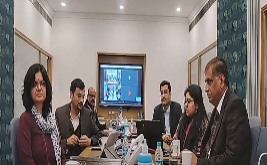
Dr Niranjan Saggurti, Country Director, Population Council India, set forth the scope of the NIRDPR-PCI partnership and underlined the potential of collaborative efforts in the holistic development of the Aspirational Blocks.
Addressing the meeting, Dr G. Narendra Kumar, IAS, Director General, NIRDPR, expressed that the PCI’s collaboration would be valuable in supporting the Government of India in strengthening its programmes and policies by fostering efficiency in the rural development initiatives.
The MoU was signed by Shri Manoj Kumar, Registrar & Director (Admin), NIRDPR and Dr Sowmya Ramesh, Executive Director, PCI, in the presence of Dr Ruchira Bhattacharya, Dr C. Kathiresan, Associate Professor, Shri Chiranji Lal, Assistant Director, and Dr Venkatamallu Thadaboina, Research Officer from NIRDPR, and Shri Punit Mishra, Lead-Partnerships, Population Council.
National Seminar on Good Governance Practices in MGNREGS
The Centre for Good Governance and Policy Analysis (CGGPA), NIRDPR organised a National Seminar on ‘Good Governance Practices in MGNREGS’ from 13th-14th December 2023. This seminar was specifically designed with a major focus on aspects of good governance practices in MGNREGA.
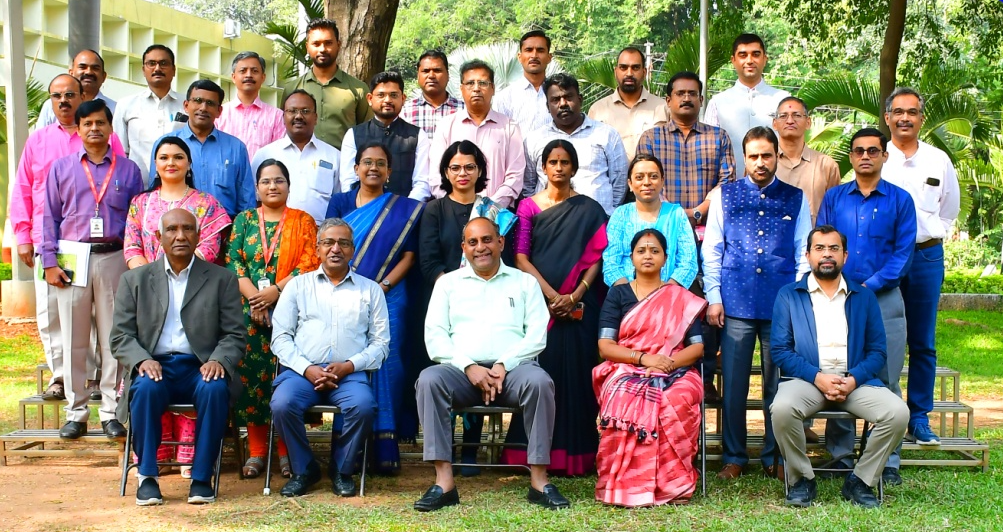
The objectives of the seminar were i) to explore the adapted strategies of Good Governance in the planning and implementation of MGNREGS, ii) to explore the Governance practices at the Grassroots to strengthen rural livelihoods through MGNREGS, iii) to search for Accountability Practices in MGNREGS towards achieving Sustainable Development Goals, iv) to collect and compile the Best Practices of Good Governance with special reference to planning, Implementation and Monitoring MGNREGS, and v) to identify the unique and innovative areas of participatory decision making and convergent actions in MGNREGA.
The seminar aimed to understand the implementation issues in MGNREGA based on ground reality and discuss good governance strategies for better implementation of the programme through a transparency and accountability framework. The participants were given adequate opportunities to express their views and problems in the implementation of the MGNREGA. They were also encouraged to share their experiences of handling field problems with amicable alternatives with region-specific customised solutions. During the seminar sessions, the participants were given ample opportunities to interact on various stages of planning, implementation and monitoring of MGNREGA and discuss the application of good governance principles for better transformation of local resources into valuable services.
The technical sessions of the seminar were dynamic and included short introductory presentations by the Chair of the session, followed by a presentation of 3 or 4 theme-specific papers by the authors and two presentations by the state executives about their respective states.
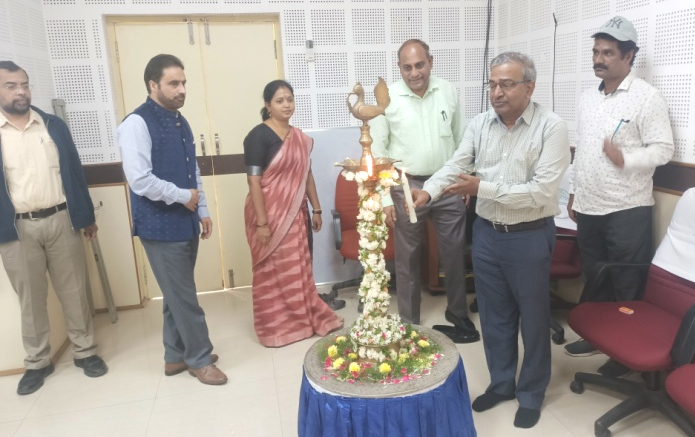
The inaugural session of the seminar started with the Welcome Address of Dr. P. P. Sahu, Associate Professor & Head, CGGPA. The objectives of the seminar were presented by Dr R. Aruna Jayamani, Seminar Director and Assistant Professor, CGGPA.
The seminar was inaugurated by Dr G. Narendra Kumar, IAS, Director General, NIRDPR along with other dignitaries. The DG, in his inaugural address, emphasised the importance and role played by the MGNREGS in strengthening the rural livelihoods and the quantum of money pumped into the scheme to cover the entire rural spectrum of the country. He also stressed the quantum of employment generated for rural needy families, which in turn, helps the financial empowerment of rural poor households. The DG highlighted how the MGNREGS has been contributing to achieving the Sustainable Development Goals (SDGs). He linked each SDG with the various activities of the MGNREGS. The DG concluded with his suggestions on further strengthening the implementation process of the scheme by adopting good governance practices.
Dr. D. Rajasekhar, Director, Institute for Social and Economic Change (ISEC), Bengaluru delivered a special address on the theme ‘Good Governance Practices in MGNREGA across the country.’ In his presentation, he illustrated with evidence how MGNREGA benefits the disadvantaged groups across major states of India. “MGNREGA showed its vast potential during the COVID-19 pandemic. The allocations to the programme have gone up from Rs. 34,500 crore in 2014-15 to Rs. 98,000 crore in 2021-22 – an increase of almost three times. This implies there is considerable and renewed interest in the programme by the government. In this context, there is a need to assess the good governance principles followed in the implementation of the programme,” he added.
Around 30 people participated in the seminar and 25 experts presented papers on various identified themes. The five major themes identified were i) Good Governance in MGNREGA, ii) MGNREGA in strengthening Rural Livelihood, iii) Accountability Practices in MGNREGS towards achieving Sustainable Development Goals, iv) Best Practices of Good Governance with special reference to planning, Implementation and Monitoring of MGNREGS, and v) Viable Strategies to Improve the Efficiency of MGNREGA through Participatory Monitoring. Each theme was planned as a technical session headed by an eminent resource person. The five technical sessions were chaired by Prof. D. Rajasekhar, Director, Institute for Social and Economic Change, Bengaluru, Prof. Devi Prasad Juvvadi, Director, Centre for Good Governance, Hyderabad, Dr. P. Sakthivel, Professor, Annamalai University, Tamil Nadu, Shri Ashok Pankaj, Professor & Director, Centre for Social Development (CSD), New Delhi, Prof. Sujit Kumar Mishra, Regional Director, CSD, Hyderabad, respectively.
The participants included academicians, researchers, faculty members of NIRDPR and officials representing Karnataka, Maharashtra, Tamil Nadu, Odisha, Punjab, Gujarat, and Jammu & Kashmir, who were involved in the execution of MGNREGA.
A few experts, namely Shri Prashant Kumar Mittal, Deputy Director General, NIC, New Delhi and Ms Aditi Singh IAS Director, and two Under Secretaries MGNREA Division of MoRD shared their views through online mode.
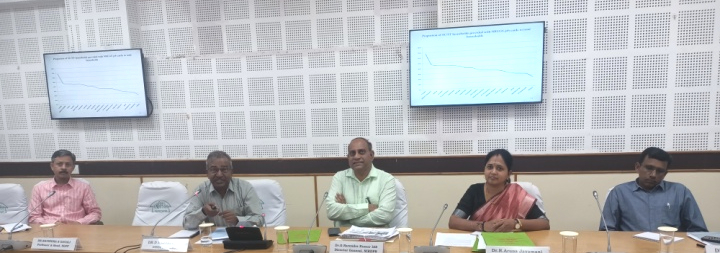
The seminar largely covered the module in the areas of Transparency and Accountability framework in MGNREGA, Rural Poverty and Livelihood, MGNREGA contribution towards development, Participatory Techniques for Transparent Administration, Social Accountability, Good Governance, Geo-tagging techniques in planning and monitoring of MGNREGS and Cases on Practices of Good Governance for transparent administration for the well-being of the rural people.
Following the paper presentations and deliberations during sessions, the experts further put forth their recommendations for improving the planning process, strengthening Rural Livelihoods and Addressing Poverty through MGNREGA, adopting accountability practices in MGNREGS towards achieving Sustainable Development Goals, viable Strategies to improve the Efficiency of MGNREGA through Participatory Monitoring, etc.
NIRDPR faculty members Dr Ravindra S. Gavali, Dr P. P. Sahu, Dr P. Kesava Rao, Dr N. S. R. Prasad, Dr U. Hemantha Kumar, Dr R. Chinnadurai, Dr Digambar A. Chimankar, Dr Sonal Mobar Roy, Dr Krishna Lohidas, Dr Vanishree J. and Dr R. Aruna Jayamani presented papers in the seminar. The reports of all technical sessions were presented to the MGNREGA Division of the Ministry of Rural Development representatives.
The seminar concluded with the valedictory address by Dr. G. Narendra Kumar, IAS, Director General, NIRDPR and a vote of thanks.
NIRDPR Organises Hindi Workshop for Reclassified Group ‘C’ Employees
A Hindi workshop for the reclassified Group ‘C’ employees of the National Institute of Rural Development and Panchayati Raj, Hyderabad, was organised on 19th December 2023.
Dr P. K. Ghosh, Assistant Registrar (E), Dr Bela, Deputy Director, Hindi Teaching Scheme, Hyderabad and Smt. Anita Pandey, Assistant Director (Official Language), NIRDPR were present in the inaugural session.
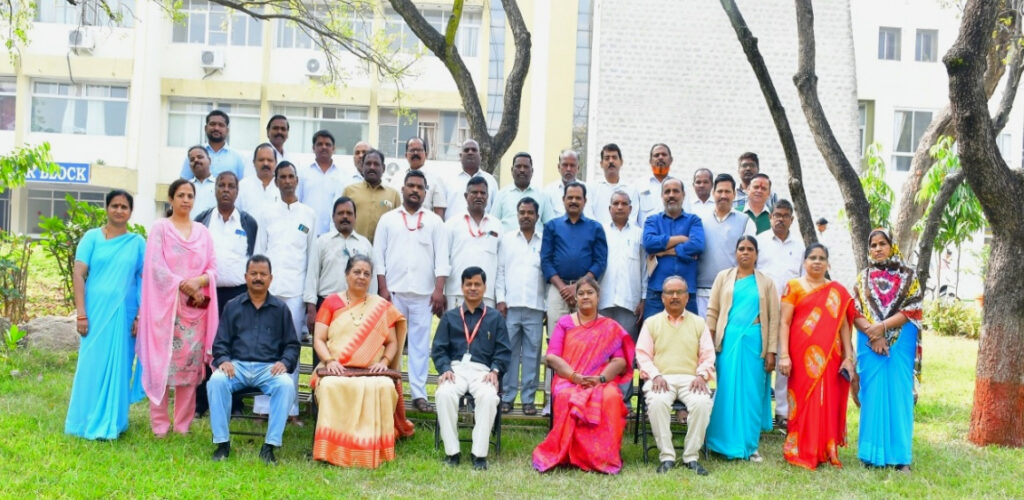
Dr P. K. Ghosh, Assistant Registrar (E), in his address, highlighted the importance of Hindi and his experience related to learning the language. Smt. Anita Pandey, Assistant Director (Official Language) expressed her experiences in initiating Hindi workshops in NIRDPR and laid special emphasis on why Hindi training was necessary for reclassified Group ‘C’ employees.
The workshop was organised in two sessions. Dr Bela, Deputy Director, Hindi Teaching Scheme trained the participants on drafting, note-based practical Hindi and short sentence structure. Nearly 35 reclassified Group ‘C’ employees of the Institute attended the Hindi workshop.
Shri E. Ramesh, Senior Hindi Translator anchored the workshop and proposed the vote of thanks. All employees of the Official Language Section, NIRDPR assisted in the conduct of the workshop.
International Training Programme on Leadership Development for ERs of Women Development Committee
The Centre for Panchayati Raj, Decentralised Planning and Social Service Delivery, NIRDPR, organised an on-campus International Training Programme on ‘Leadership Development for Elected Representatives of Women Development Committee’ for the elected representatives of the Republic of Maldives, from 17th – 30th December, 2023. A total of 30 female participants from various Committees of Male, including WDC members, WDC Presidents, WDC Vice Presidents, Local Government Authority officials from the Republic of Maldives, Ministry of External Affairs, Male attended the programme.
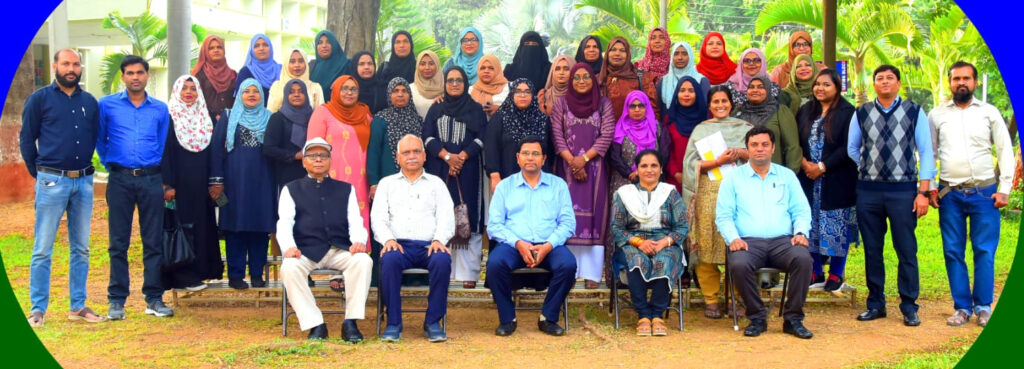
The objectives of the programme were (i) to expand the vision of the representatives of Women Development Committees from Maldives about the leadership roles, (ii) to enhance their understanding about Service Delivery, Redressal of Public Grievances, Social Protection and Social Cohesion rendered by the Local Committees of Maldives, (iii) to develop their awareness about political and economic empowerment of women with reference to a few good practices, (iv) to augment their awareness about Localisation of Sustainable Development Goals (SDGs), v) to enhance their understanding about sustainable local economic development with thrust on primary sector activities and expansion of livelihood opportunities in other sectors, iv) to expose the participants to the rich cultural heritage in India, (v) to develop overall capacity of the participants on healthy group dynamics in Women Development Committees with focus on participation, communication, facilitation, leadership, decision-making, conflict resolution, problem solution and stages of group development, (vi) to develop their understanding about the scope for emulating innovative and appropriate rural, (vii) to develop their understanding about GIS-based Land Use Planning (viii) to develop their understanding about the scope for improving the status of solid and liquid waste management and scope for urban amenities, and (ix) to develop their awareness of climate change management and overall environmental upgradation with reference to a few good practices in India.
After the self-introductory session, Dr. Anjan Kumar Bhanja, Course Director, Associate Professor & Head, CPRDP&SSD, NIRDPR, delivered the inaugural address. Thanking the Ministry of External Affairs, Government of India for the opportunity given to treat the participants as “Brand Ambassadors” of NIRDPR, Dr Anjan Kumar Bhanja gave a brief overview of how NIRDPR has been working to reduce poverty through several government schemes.
Shri Kiran Yadav, First Secretary (Political), Male, Maldives said the programme aims to allow the island communities and Women Development Committee members to make their own decisions in a democratic and accountable manner, to improve people’s living standards through social, economic and cultural development, and bring the services closer to the people. Senior Consultants of CPRDP&SSD Mr Dilip Kumar Pal and Mr Mohd. Taquiddin welcomed the participants and gave a brief overview of the programme.
The training programme covered various aspects related to the theme such as expansion of the representatives’ vision of the WDCs and the roles they can play in developing the status of women in society, promoting leadership among members of WDC, need for localisation of Sustainable Development Goals and scope for attainment of the SDGs through Local Committees and WDC with special reference to the good practices in India, scope of improving the status of service delivery, redressal of public grievances, social Protection and social cohesion in favour of women in the islands of Maldives, scope for political, economic empowerment of women with reference to a few good practices, and scope for application of solar technology in the context of Maldives. Besides, the participants were taken on field visits to experience the political and economic empowerment of women in the area through NRLM.
The participants were introduced to best practices in solid waste management in India, Rural Entrepreneurship in the context of economic development of Women in Maldives, healthy group dynamics with a focus on leadership, participation, communication, facilitation, decision-making, conflict resolution, stages of group development and significant effects of able Leadership-in the functioning of WDCs, and scope for emulating innovative and appropriate rural technology and improvement in the fisheries sector of Maldives.
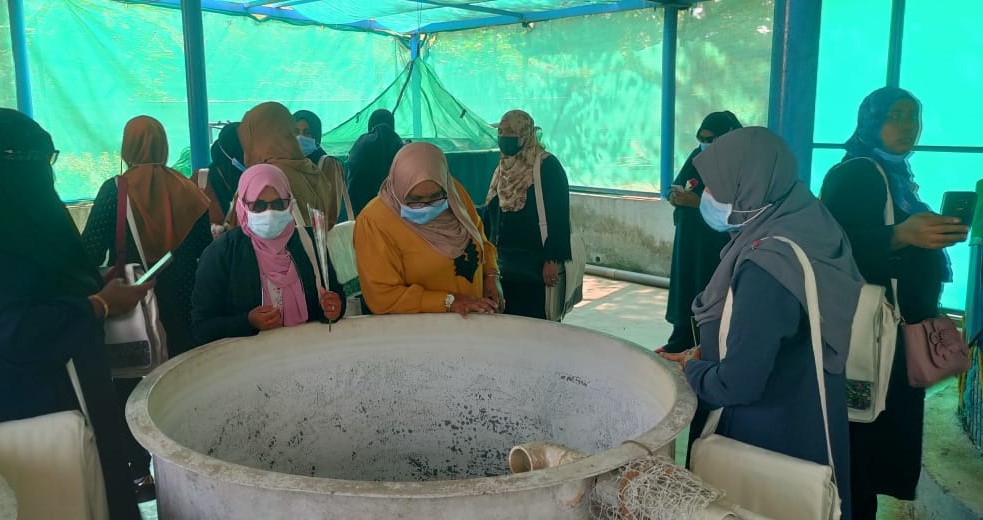
To impart practical knowledge and reinforce the learning made in the classroom, field visits were organised to Rural Technology Park (RTP), Raja Rajeswari SHG in Kyathampally village of Hanumakonda district, and Mulkanoor Women’s Cooperative Dairy (Swakrushi) in Mulkanoor village of Warangal (Urban) district. Dr Kathiresan, Associate Prof. & Head, CIAT, NIRDPR and Mr Mohd. Khan, Senior Consultant, CIAT, NIRDPR, with the help of PPTs, video clips, and unit visits, explained the activities of RTP emphasising the importance of frugal innovations in the rural economy.
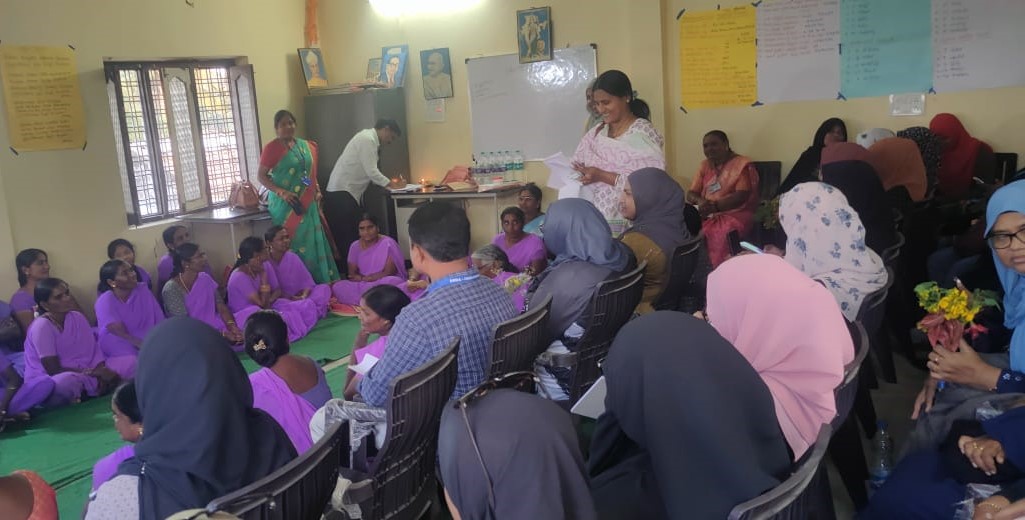
Faculty members of NIRDPR and subject matter specialists cum practitioners with rich experience and expertise in the areas of rural development, SHGs, Livelihood promotion, panchayati raj, NRLM, rural entrepreneurship, wind and solar technology, etc., contributed to the success of the programme.
The programme was a success, as per the feedback received from the participants. They felt that the programme was organised systematically. Further, they felt that the serene training ambience, clean and hygienic surroundings and the infrastructure facilities led to the success of the training programme.
The programme was coordinated by Dr Anjan Kumar Bhanja, Associate Professor & Head CPRDP&SSD, NIRDPR and Ms A. Sirisha, Project Training Manager.
UBA Cell, NIRDPR Conducts Two Mission LiFE Programmes
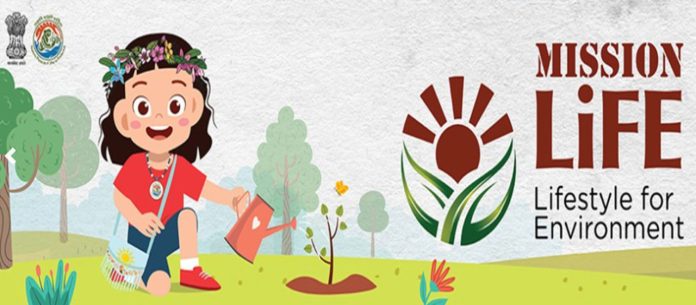
India, as leader of G20, is involved in a massive behaviour change movement in favour of preserving the environment and ecosystem. This aims to bring about simple lifestyle changes at individual and community levels that will reduce carbon emissions while enhancing the green cover, which will serve as a carbon sink. The actions proposed are simple such as saving water, saving energy, responsible waste disposal and so on. Yet, they are hardly practised by many. What is required at this moment is a mindful living. Many of the problems associated with climate change have to do with unmindful living. Thus, nudging people ‘from being aware to getting into action is Mission LiFE’.
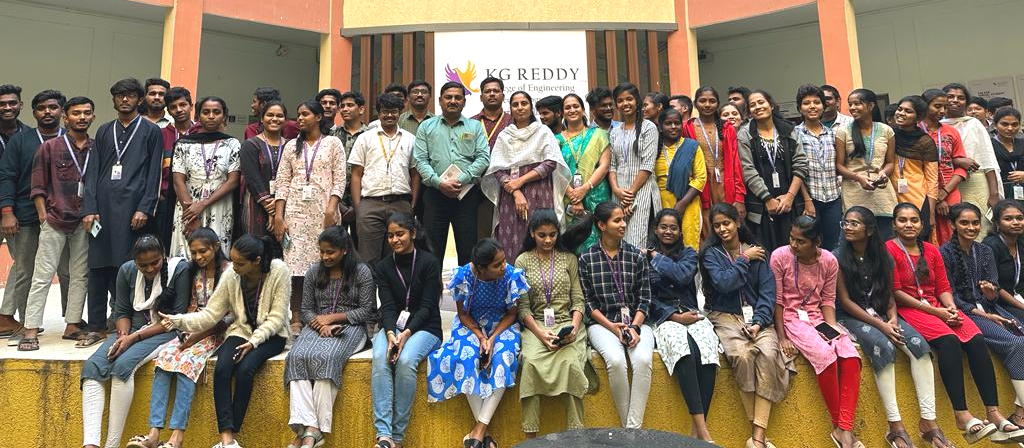
The Unnat Bharat Abhiyan Cell of the NIRDPR has proposed to conduct a series of Mission LiFE programmes among the students and teachers of UBA Participating Institutions in Hyderabad, and two programmes were conducted in December 2023. The first programme conducted at Martrusri Engineering College was attended by nearly 100 students and faculty members whereas about 120 students and faculty members participated in the other one conducted at KG Reddy College of Engineering.
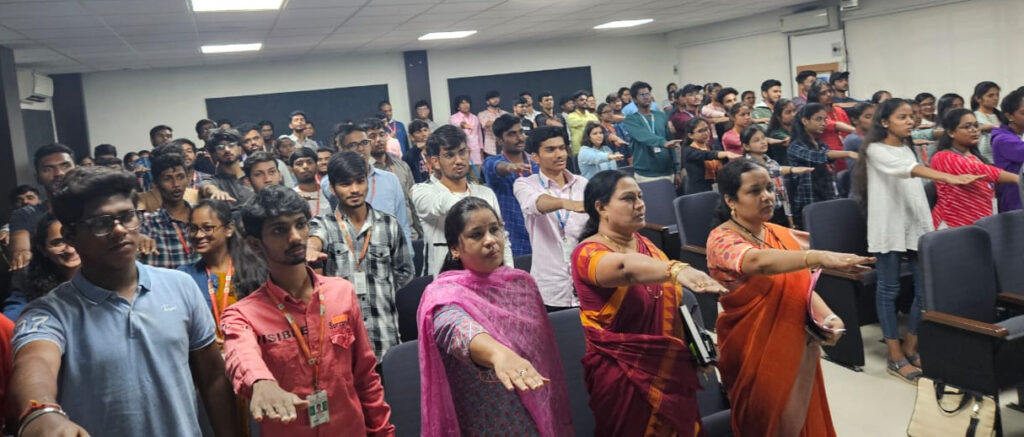
Themes such as Water Saving, Energy Saving, and Responsible Waste Disposal were covered. In order to make the sessions interesting, quiz and running thematic short films were made part of the programme. The quiz made the sessions live and interactive. The participants were nudged to adopt at least five new behaviours. It was reiterated to them that being aware is one, whereas putting that in action is another. What Mission LiFE seeks is action in our daily lives. Besides, the students were administered the Mission LiFE pledge.
Training cum Exposure Visit to Best Practices of MGNREGS Works in Andhra Pradesh
A three-day Training cum Exposure visit to Best Practices of Mahatma Gandhi NREGS works was conducted at Andhra Pradesh Human Resource Development Institute (AP HRDI), Visakhapatnam from 13th-15th December 2023.
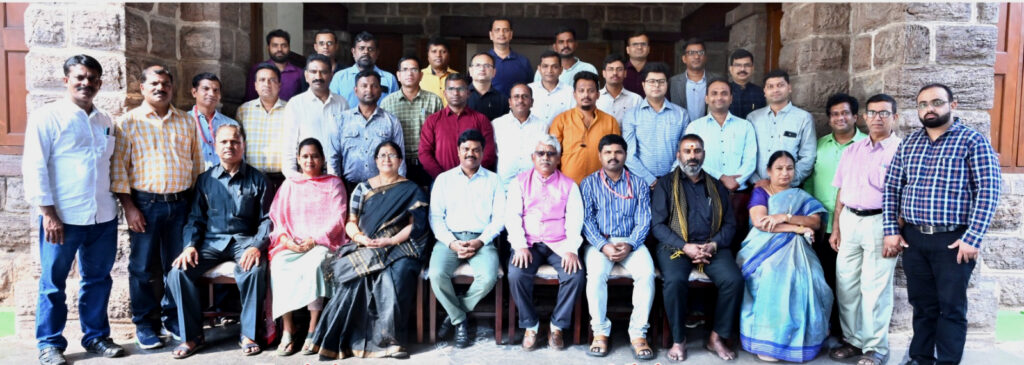
During the field visits, the trainees were given an overview of various activities/works taken up under the MGNREGS in Visakhapatnam and Vizianagaram districts of Andhra Pradesh. Officials associated with MGNREGS from nine states, namely Bihar, Chhattisgarh, Gujarat, Karnataka, Kerala, Odisha, Maharashtra, Telangana and Uttar Pradesh attended the programme. The programme was attended by Shri M. Siva Prasad, Joint Commissioner as Chief Guest and Shri M. Mallikarujuna, Deputy Commissioner as Guest of Honour.
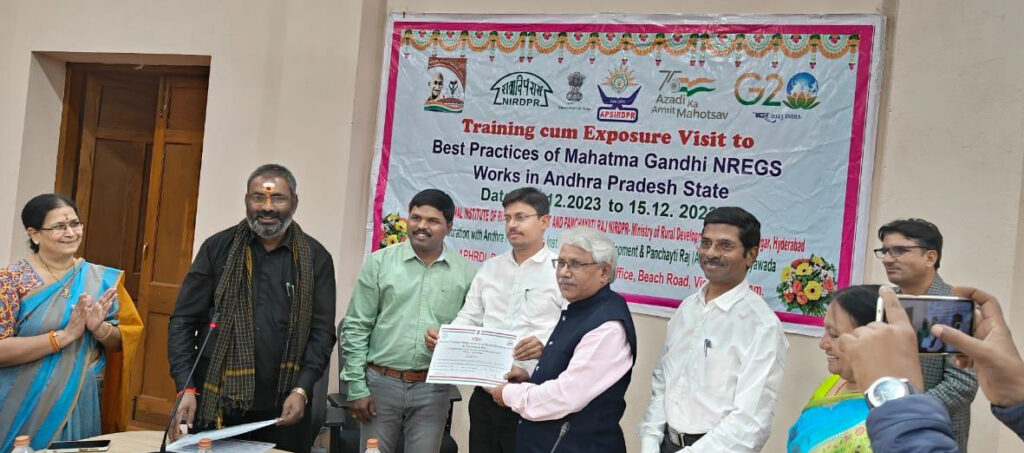
Shri Sandeep, Project Director, DWMA Visakhapatnam, and his team facilitated the Visakhapatnam field visit on best practices of MGNREGS in the district. Smt. Swarnalatha, Project Director, DWMA Vizianagaram and her team facilitated the fieldwork in Vizianagaram district. Smt. Shubashini, Joint Director, APSIRDPR and Shri Y. Dhosireddy, Joint Director and Course Director jointly coordinated the programme along with the NIRDPR team comprising Dr Raj Kumar Pammi, Assistant Professor and Shri P. Sudhakar Reddy, Research Associate, Centre for Wage Employment & Livelihoods, NIRDPR.
Workshop on Technology Enabled Learning in the Context of Gram Rozgar Sevak (GRS) e-Prashikshan
A workshop titled ‘Technology Enabled Learning in the Context of Gram Rozgar Sevak (GRS) e-Prashikshan’was organised at the National Institute of Rural Development and Panchayati Raj, Hyderabad, on 22nd November, 2023. The workshop was conducted by Dr. Sonal Mobar Roy, Assistant Professor, CWEL and Dr. C. Dheeraja, Associate Professor and Head, CWEL. Prof. V. Venkaiah, Commonwealth Educational Media Centre for Asia was the resource person for the workshop.
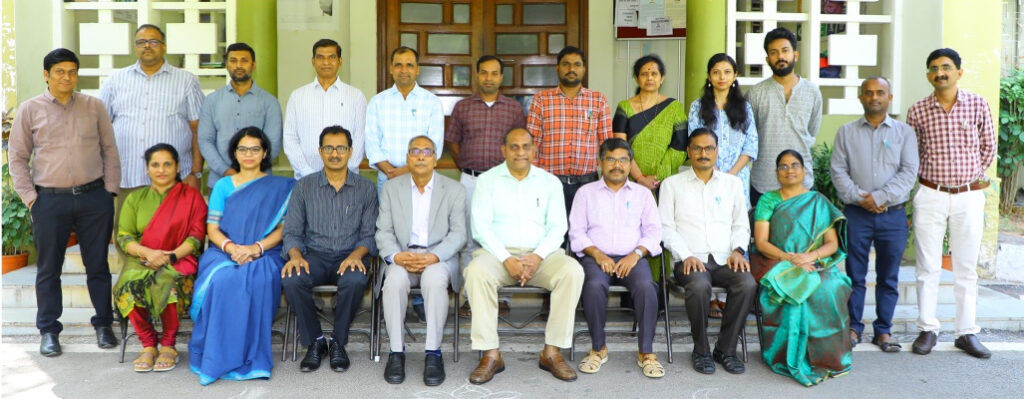
The opening remarks were rendered by Dr. C. Dheeraja who laid the roadmap for discussion, besides the background of the workshop. Based on the suggestion of the Ministry of Rural Development, NIRDPR has come up with e-contents to train the Gram Rozgar Sevaks/Sahayaks across the country. As the GRSs deal with the public, they need to be trained in proper communication skills to connect with people and perform better. They need to mobilise the community and act as agents of change. As the GRSs work at the Panchayat level and do multiple roles, they need to have adequate knowledge base and skills required as per situations that arise. They need to understand the basic functions of the Panchayats and other line departments, and also the nuances of the Mahatma Gandhi NREGA including work projections, labour budgets, technical know-how and good communication skills. They also need critical skills to implement good governance practices under Mahatma Gandhi NREGA. Hence, capacity building of GRSs is very essential. For developing this course, the GRS team at NIRDPR needed a brief refresher on Technology Enabled Learning (TEL), and therefore this workshop was organised.
Thematic Deliberations
The workshop was divided into three sessions:
1. Quality Assurance in Technology Enabled Learning
2. ICTs and Open Educational Resources -New Dynamics & Key Trends
3. Quality Assurance in Blended and Online Learning
Session-I: Quality Assurance in Technology-Enabled Learning
In the first session, Prof. V. Venkaiah began with ‘The Idea of the University’ referring to the UNESCO Education Report (1996). He elaborated on the four pillars of education and their importance. Further, he examined the status of higher education in India and discussed the employability and skill gaps, thus highlighting the challenges in higher education. He also discussed the quality assurance system in higher education, its philosophy and process, the various quality initiative approaches and principles, and finally summed up the session with the concept of Optimal Learning Environment (OEL) drawn from the National Education Policy, 2020.
Session-II: ICTs and Open Educational Resources -New Dynamics & Key Trends
In the second session, Prof. Venkaiah dealt with ‘ICTs and Open Educational Resources -New Dynamics & Key Trends’ where he elaborated on the current reality of ICTs, types of ICTs in higher education, and the transition towards a paperless world through digitisation. He deliberated upon Open Educational Resources (OER) and Open Access and their relation in the quality domain. He discussed UNESCO’s recommendations and focused on Indian experiences with Open Educational Resources (OER). He concluded the session by highlighting Open Access, its benefits, policy issues and the importance of Creative Commons licence.
Session-III: Quality Assurance in Blended and Online Learning
In the third session, Prof. Venkaiah discussed the role of teachers in online learning, challenges and barriers faced by them and also the strategies to help teachers in designing and delivering quality online courses. He deliberated on the concept of blended learning, online facilitation, MOOCs, Open Educational Resources based courses, etc. He also talked about elements of quality assurance in OER, digital pedagogy, and Optimal Learning Environment (OLE), and suggested ways to have a better online facilitation process. Apart from the above-mentioned topics, Prof. Venkaiah also suggested GRSs to read books/documents such as the UNESCO Education Report, 1996, The Idea of the University, Think Big, Future Shock, Totto-Chan; The Digital Age and many others.
The workshop was delivered in an interactive mode and the participants were actively engaged in discussions throughout the sessions. In the valedictory session, Dr. Dheeraja honoured Prof. V. Venkaiah with a memento. The workshop concluded with a vote of thanks by Dr Sonal Mobar Roy.
MoRD, NIRDPR Organise SARAS Aajeevika Mela-2023 at 42nd IITF in New Delhi
The SARAS Aajeevika Mela is an initiative under Deendayal Antyodaya Yojana – National Rural Livelihoods Mission (DAY-NRLM), Ministry of Rural Development (MoRD), Government of India to bring the rural women SHG members formed under DAY-NRLM under one platform to showcase their skills and products. SARAS Aajeevika Mela also provides an opportunity for SHG members to sell their products and build linkages with potential market players at a fair price.
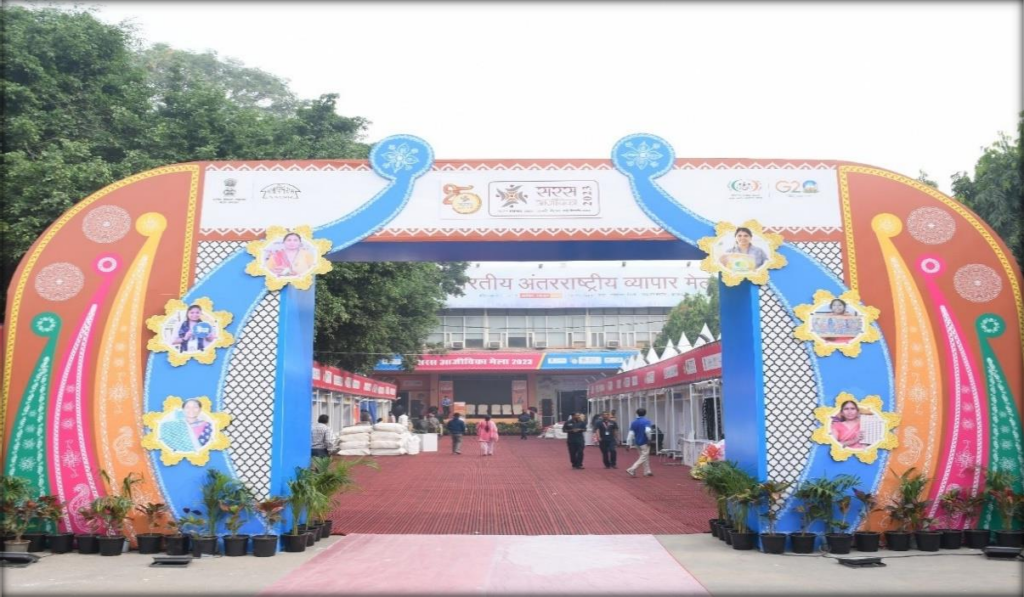
The Ministry of Rural Development and National Institute of Rural Development and Panchayati Raj (NIRDPR) have been organising SARAS Aajeevika Mela at Delhi/NCR on various occasions. Over 25 years now, SARAS Aajeevika Mela has evolved as a brand and has brought a wide range of products handcrafted by the SHGs of DAY-NRLM. Taking this forward, NIRDPR and the Ministry of Rural Development organised SARAS Aajeevika Mela during the 42nd India International Trade Fair (IITF)-2023 at Pragati Maidan, New Delhi from 14th to 27th November 2023.
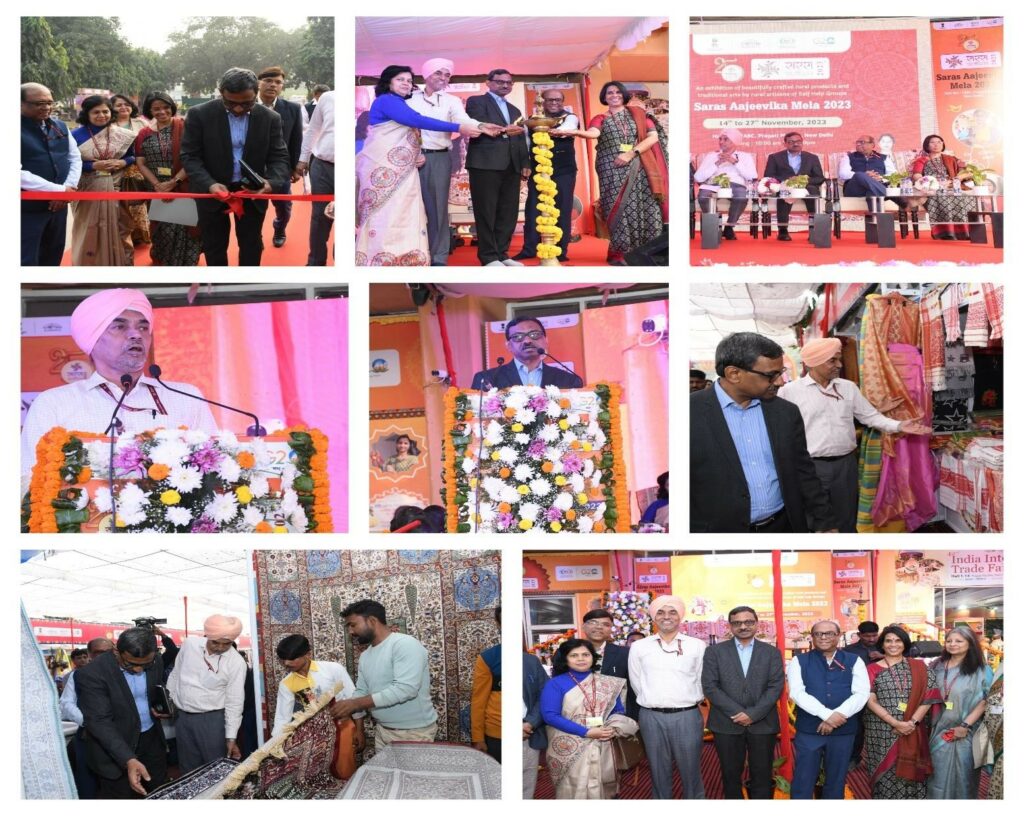
The SARAS Aajeevika Mela at IITF-2023 was inaugurated by Shri Shailesh Kumar Singh, Secretary, Ministry of Rural Development, Government of India on 16th November 2023. He addressed the SHG members and visited the SARAS stalls to encourage them. Shri Charanjit Singh, Additional Secretary (RL), MoRD, Smt. Smriti Sharan, Joint Secretary (RL), Shri Raghvendra Pratap Singh, Director (RL), MoRD, and other senior officers/dignitaries were also present during the inaugural function.
The Mela offered products belonging to various handicraft and handloom categories, besides food items. The Ministry invited SHGs from all States/UTs across the country and around 180 SHGs participated in the event. In addition, the Ministry also installed stalls for the SARAS Gallery, e-SARAS, and Some Stalls under VIP Reference.
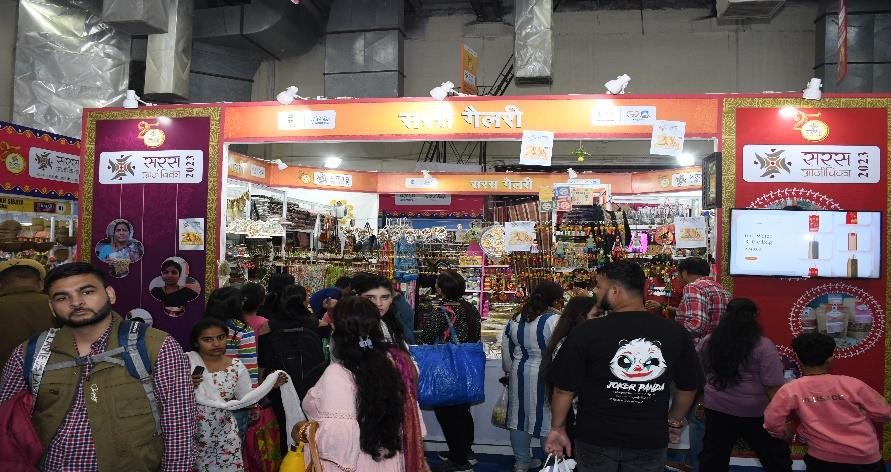
The Centre for Marketing & Promotion of Rural Products, Entrepreneurship Development (CMPRPED), NIRDPR Delhi Branch organised two workshops on Marketing Skills for capacity building of SHGs and two Business to Business (B2B) Meetings to establish direct market linkages of SHGs and their products with these e-Marketing Agencies like Meesho, ONDC, Flipkart, Signcatch, etc.
The ‘SARAS Gallery’ at Handicrafts Bhawan, BKS Marg, New Delhi featured a carefully picked selection of goods made by underprivileged SHG women across India. A wide variety of goods were available at affordable costs at the ‘SARAS Gallery.’ The distinctive niche crafts produced by women SHGs were of the highest calibre, without flaws, environmentally friendly, handcrafted, and possessed exquisite craftsmanship, and traditional features. Ecological specificity, cultural specificity, traditional features, and mythological aspects were some of its distinctive characteristics.
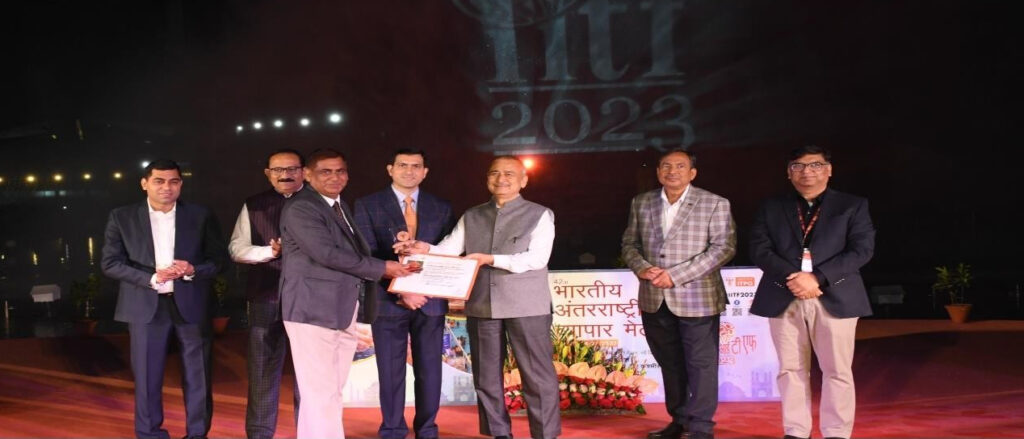
The cultural programmes, including plays, magic shows, music and dance performances were one of the main attractions for customers.
Overall, the SARAS Aajeevika Mela-2023 recorded sales of Rs. 6.83 crore. Due to best effort, management, and dedication by NIRDPR Delhi Branch Officials towards managing all activities of the event as per the parameters of ITPO, the SARAS Aajeevika Mela received the Bronze Medal (Third Prize) from ITPO amongst all events organised by several Ministries/State governments/international organizations/ foreign countries.
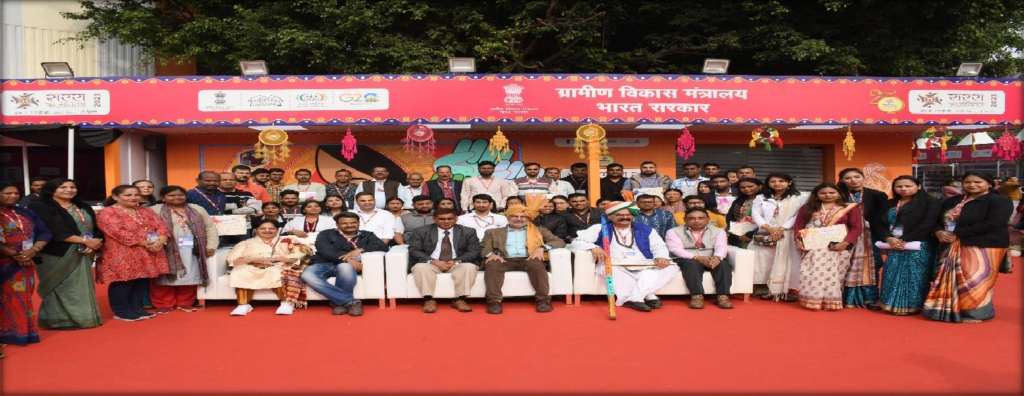
The closing ceremony of SARAS Aajeevika Mela at IITF, Pragati Maidan was held on 27th November 2023. Shri Vinod Kumar, Under Secretary (RL), MoRD, and Shri Chiranji Lal, AD (CMPRPED), NIRDPR Delhi Branch were present during the closing ceremony. Certificates acknowledging the participation of SHGs and State Coordinators were distributed by Shri Shailendra Kumar, Director (Finance), MoRD and Shri Raman Vadhwa, Deputy Director (RL), MoRD. Mementoes were also distributed to security, housekeeping, medical, volunteers, NIRDPR officials, etc., in recognition of their services.
